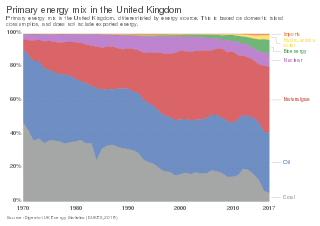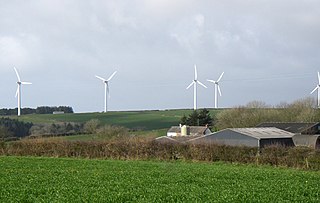Related Research Articles

Energy conservation is the effort made to reduce the consumption of energy by using less of an energy service. This can be achieved either by using energy more efficiently or by reducing the amount of service used. Energy conservation is a part of the concept of Eco-sufficiency. Energy conservation measures (ECMs) in buildings reduce the need for energy services and can result in increased environmental quality, national security, personal financial security and higher savings. It is at the top of the sustainable energy hierarchy. It also lowers energy costs by preventing future resource depletion.
The United Kingdom's Climate Change Programme was launched in November 2000 by the British government in response to its commitment agreed at the 1992 United Nations Conference on Environment and Development (UNCED). The 2000 programme was updated in March 2006 following a review launched in September 2004.
The Renewables Obligation (RO) is designed to encourage generation of electricity from eligible renewable sources in the United Kingdom. It was introduced in England and Wales and in a different form in Scotland in April 2002 and in Northern Ireland in April 2005, replacing the Non-Fossil Fuel Obligation which operated from 1990.

In environmental policy, white certificates are documents certifying that a certain reduction of energy consumption has been attained. In most applications, the white certificates are tradable and combined with an obligation to achieve a certain target of energy savings. Under such a system, producers, suppliers or distributors of electricity, gas and oil are required to undertake energy efficiency measures for the final user that are consistent with a pre-defined percentage of their annual energy deliverance. If energy producers do not meet the mandated target for energy consumption they are required to pay a penalty. The white certificates are given to the producers whenever an amount of energy is saved whereupon the producer can use the certificate for their own target compliance or can be sold to (other) parties who cannot meet their targets. Quite analogous to the closely related concept of emissions trading, the tradability in theory guarantees that the overall energy saving is achieved at least cost, while the certificates guarantee that the overall energy saving target is achieved.
Domestic housing in the United Kingdom presents a possible opportunity for achieving the 20% overall cut in UK carbon dioxide emissions targeted by the Government for 2010. However, the process of achieving that drop is proving problematic given the very wide range of age and condition of the UK housing stock.

Total energy consumption in the United Kingdom was 142.0 million tonnes of oil equivalent in 2019. In 2014, the UK had an energy consumption per capita of 2.78 tonnes of oil equivalent compared to a world average of 1.92 tonnes of oil equivalent. Demand for electricity in 2014 was 34.42 GW on average coming from a total electricity generation of 335.0 TWh.
Various energy conservation measures are taken in the United Kingdom.

The energy policy of the United Kingdom has achieved success in reducing energy intensity, reducing energy poverty, and maintaining energy supply reliability to date. The United Kingdom has an ambitious goal to reduce carbon dioxide emissions for future years, but it is unclear whether the programs in place are sufficient to achieve this objective. Regarding energy self sufficiency, the United Kingdom policy does not address this issue, other than to concede historic energy self sufficiency is currently ceasing to exist. With regard to transport, the United Kingdom historically has a good policy record encouraging public transport links with cities, despite encountering problems with high speed trains, which have the potential to reduce dramatically domestic and short-haul European flights. The policy does not, however, significantly encourage hybrid vehicle use or ethanol fuel use, options which represent viable short term means to moderate rising transport fuel consumption. Regarding renewable energy, the United Kingdom has goals for wind and tidal energy. The White Paper on Energy, 2007, set the target that 20% of the UK's energy must come from renewable sources by 2020.
CESP may refer to:
Energy Saving Trust (EST) is a British organization devoted to promoting energy efficiency, energy conservation, and the sustainable use of energy, thereby reducing carbon dioxide emissions and helping to prevent man-made climate change. It was founded in the United Kingdom as a government-sponsored initiative in 1992, following the global Earth Summit.
The Carbon Emission Reduction Target (CERT) in the United Kingdom is a target imposed on the gas and electricity transporters and suppliers under Section 33BC of the Gas Act 1986 and Section 41A of the Electricity Act 1989, as modified by the Climate Change and Sustainable Energy Act 2006

Green electricity in the United Kingdom. There are a number of suppliers offering green electricity in the United Kingdom. In theory these types of tariffs help to lower carbon dioxide emissions by increasing consumer demand for green electricity and encouraging more renewable energy plant to be built. Since Ofgem's 2014 regulations there are now set criteria defining what can be classified as a green source product. As well as holding sufficient guarantee of origin certificates to cover the electricity sold to consumers, suppliers are also required to show additionality by contributing to wider environmental and low carbon funds.

Efficient energy use, sometimes simply called energy efficiency, is the goal to reduce the amount of energy required to provide products and services and can also reduce effects of air pollution. For example, insulating a building allows it to use less heating and cooling energy to achieve and maintain a thermal comfort. Installing light-emitting diode bulbs, fluorescent lighting, or natural skylight windows reduces the amount of energy required to attain the same level of illumination compared to using traditional incandescent light bulbs. Improvements in energy efficiency are generally achieved by adopting a more efficient technology or production process or by application of commonly accepted methods to reduce energy losses.

Renewable energy in the United Kingdom contributes to production for electricity, heat, and transport.
A feed-in tariff is when payments are given by energy suppliers if a property or organisation generates their own electricity using technology such as solar panels or wind turbines and feeds any surplus back to the grid. In the United Kingdom, they were entered into law by the Energy Act 2008 and took effect from April 2010. The scheme closed to new applicants on 31 March 2019.

Energy policy of Finland describes the politics of Finland related to energy. Energy in Finland describes energy and electricity production, consumption and import in Finland. Electricity sector in Finland is the main article of electricity in Finland.
The Green Deal was a UK government policy initiative that gave homeowners, landlords and tenants the opportunity to pay for energy efficient home improvements through the savings on their energy bills from 2012 to 2015. At the heart of the Green Deal was the rule that savings on bills would exceed the cost of the work. By meeting this 'Golden Rule', consumers were able to receive energy savings without direct cost. Consumers then paid back the cost of such improvements through the expected savings in their energy bills. However, there is no guarantee that the eventual savings made by consumers will match the cost of the loans they take out to make the improvements and industry bodies recognised there was a risk consumers could end up out of pocket.

Solarplicity Energy Limited was a renewable energy company based in Hertfordshire, England. In August 2019 the company became the 13th energy supplier to collapse since 2018, affecting around 7,500 domestic and 500 business customers.
The Energy Company Obligation (ECO) is a British Government program. It is designed to offset emissions created by energy company power stations. The first obligation period ran from January 2013 to 31 March 2015. The second obligation period, known as ECO2, is from 1 April 2015 to 31 March 2017.
The Energy Act 2011 is a UK Act of Parliament relating to UK enterprise law and energy in the UK.
References
- ↑ Ofgem. "Community Energy Saving Programme (CESP)" . Retrieved 26 July 2012.
- ↑ DECC. "The Green Deal and Energy Company Obligation consultation response" . Retrieved 26 July 2012.
- ↑ "CESP Update" (PDF). Ofgem. May 2013. Retrieved 16 July 2013.
- 1 2 "The final report of the Community Energy Saving Programme (CESP) 2009-2012" (PDF). Ofgem. May 2013. Retrieved 16 July 2013.